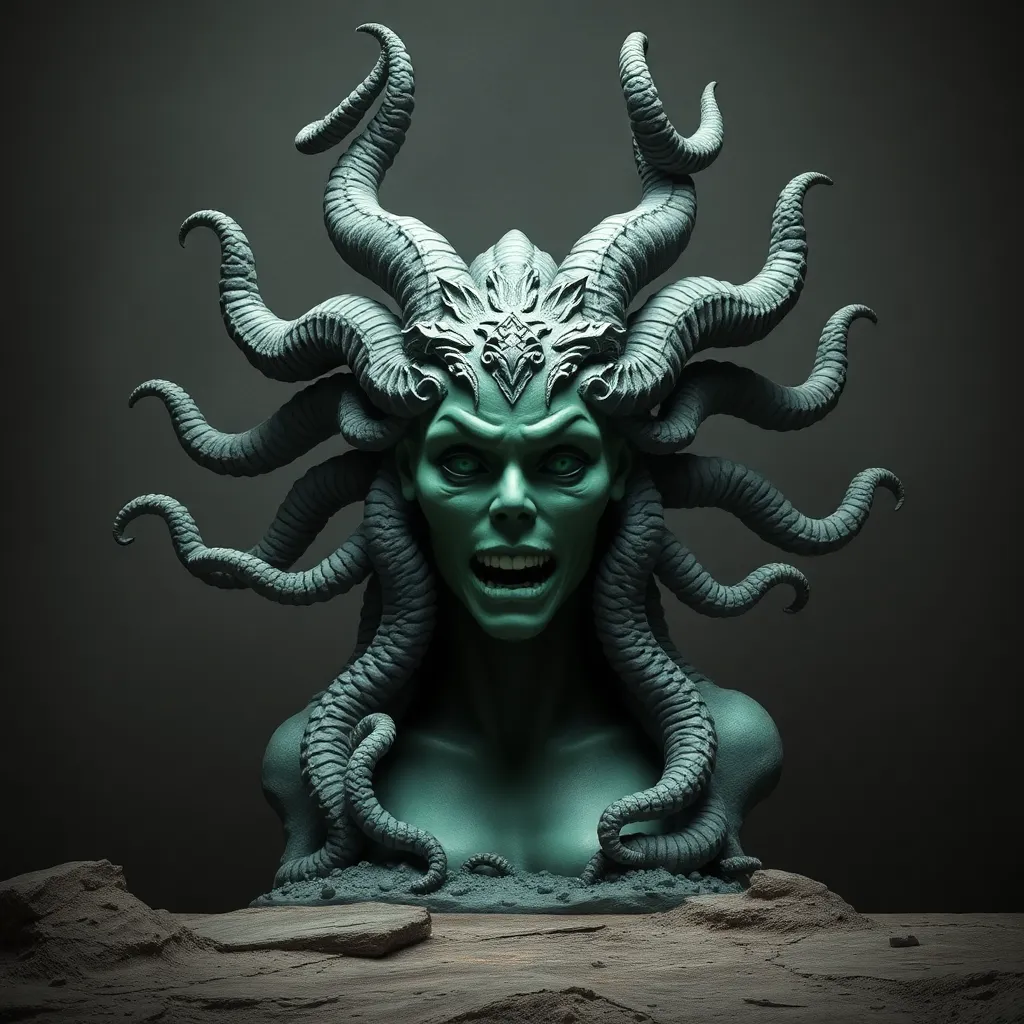Medusa’s Legacy: Examining the Gorgon’s Role as a Precursor to the Zombie Myth
I. Introduction
Medusa, the most infamous of the Gorgons in Greek mythology, has captivated audiences for centuries. Her image has transformed from a fearsome monster to a symbol of feminine rage and victimization. This article explores her significance and how she serves as a precursor to the contemporary zombie myth that has evolved in popular culture.
The zombie myth, which has gained immense popularity in recent decades, embodies themes of fear, contagion, and loss of identity. By examining the connections between Medusa and the archetype of the zombie, we can uncover deeper meanings behind these cultural narratives that reflect societal anxieties about transformation and monstrosity.
II. Medusa in Greek Mythology
A. The origins and story of Medusa
Medusa was not always the monstrous figure we know today. According to myth, she was once a beautiful maiden, a priestess in Athena’s temple. However, after being violated by Poseidon, she was cursed by Athena, transforming her into a Gorgon with snakes for hair and a petrifying gaze. This story of transformation lays the groundwork for understanding Medusa’s complex role in mythology.
B. Medusa as a symbol of transformation and fear
Medusa symbolizes the duality of beauty and horror. Her transformation serves as a cautionary tale, reflecting society’s fear of female sexuality and power. Medusa’s curse not only alters her appearance but also instills a sense of dread in those who encounter her, highlighting the societal tendency to demonize women who defy conventional norms.
C. The role of Medusa within the context of the Gorgon sisters
Medusa is one of three Gorgon sisters, each embodying different aspects of monstrosity. While Stheno and Euryale are immortal and represent unrestrained chaos, Medusa’s mortality makes her story particularly poignant. She becomes a tragic figure, evoking both fear and sympathy, which further complicates her role in the mythological narrative.
III. The Characteristics of Medusa
A. Physical attributes and their symbolic meanings
Medusa’s physical transformation is rich with symbolic meaning. Her serpentine hair represents danger and the primal instincts of nature, while her once-beautiful visage becomes a mask of horror. This transformation serves as a metaphor for the fear of losing one’s identity and the consequences of societal judgment.
B. The petrifying gaze: Psychological implications and fear
The most notable characteristic of Medusa is her gaze, which can turn onlookers to stone. This petrifying effect is not merely physical; it has psychological implications, representing the paralysis of fear and the loss of agency. It evokes the idea of being overwhelmed by one’s surroundings, a theme that resonates deeply with modern fears.
C. Medusa’s duality: Victim and monster
Medusa embodies the duality of victimhood and monstrosity. She is both a tragic figure cursed by the gods and a terrifying creature who instills fear in others. This complexity allows for a nuanced understanding of her character, challenging the binary of good versus evil and prompting discussions about empathy and monstrosity.
IV. The Emergence of Zombie Myths
A. Historical roots of zombie folklore across cultures
The notion of the zombie has roots in various cultures, particularly in Haitian Vodou, where a zombie is considered a person resurrected by a sorcerer. This concept of resurrection often carries themes of loss of agency, reflecting societal fears of control and autonomy.
B. The characteristics of traditional zombies vs. modern interpretations
Traditional zombies are often mindless and serve their masters, devoid of will or identity. However, modern interpretations have evolved, showcasing zombies as carriers of infection and contagion, often reflecting contemporary fears about disease and societal collapse.
C. The evolution of the zombie in literature and film
From early films like “Night of the Living Dead” to contemporary series such as “The Walking Dead,” zombies have come to symbolize various anxieties, including consumerism, loss of humanity, and societal breakdown. This evolution mirrors the fears surrounding identity and transformation that are also central to Medusa’s story.
V. Parallels Between Medusa and Zombies
A. Transformation and loss of identity
Both Medusa and zombies represent profound transformations that lead to a loss of identity. Medusa’s curse strips her of her former self, while zombies are often depicted as lost souls, their humanity overtaken by the undead state. This theme resonates deeply in narratives exploring the human condition.
B. The concept of contagion: Fear of the gaze vs. the bite
The fear associated with Medusa’s gaze parallels the fear of contagion seen in zombie narratives. Medusa’s gaze can petrify, leading to a kind of paralysis, while the zombie bite spreads infection, leading to a loss of identity. Both evoke a sense of dread about the loss of control and the spread of monstrosity.
C. The intersection of sexuality and monstrosity in both figures
Medusa’s transformation and the zombie mythos both explore themes of sexuality and monstrosity. Medusa’s curse can be seen as a punishment for her sexuality, while zombies often embody sexualized fears of contagion and loss of self. This intersection raises questions about societal norms and the fear of the ‘other.’
VI. Medusa’s Influence on Modern Zombie Narratives
A. Analyzing contemporary films and literature for Medusa-like themes
Modern horror narratives often incorporate themes reminiscent of Medusa. Characters who embody transformation and monstrous traits can be seen as modern-day Medusas, reflecting societal fears about identity and the consequences of transgression.
B. The role of female monstrosity in horror genres
Female monstrosity, exemplified by figures like Medusa, plays a significant role in horror genres. These characters challenge patriarchal norms, embodying the fears and anger of women in a society that often seeks to silence them. This theme persists in contemporary zombie narratives, where female characters often navigate complex identities.
C. Medusa as a metaphor for societal fears reflected in zombie stories
Medusa’s legacy as a symbol of fear and transformation resonates within zombie narratives, as both figures challenge perceptions of identity and power. The societal fears reflected in these stories often highlight the anxieties surrounding change, monstrosity, and the fragility of human existence.
VII. Cultural Reception and Interpretation
A. The reinterpretation of Medusa in feminist discourse
In recent years, Medusa has been reinterpreted through a feminist lens, viewed as a symbol of empowerment and resistance against oppression. This shift allows for a deeper exploration of her character, challenging traditional narratives that paint her solely as a monster.
B. Zombie mythos in the context of societal collapse and fear
The zombie mythos reflects societal fears about collapse, control, and the loss of civilization. These themes resonate with Medusa’s story, as both figures embody the anxieties of a society grappling with transformation and identity crises.
C. How both figures challenge traditional narratives of power and victimhood
Both Medusa and zombies challenge traditional narratives surrounding power and victimhood. They provoke discussions about agency, control, and the complexities of identity, encouraging audiences to reflect on the stories we tell about monstrosity and humanity.
VIII. Conclusion
The exploration of Medusa’s legacy reveals her profound impact on the zombie myth, illustrating the connections between fear, transformation, and identity. As cultural archetypes, both figures challenge our understanding of monstrosity and victimhood, resonating deeply within contemporary society.
In reflecting on these themes, we recognize the enduring nature of these narratives and their ability to illuminate the complexities of human experience. The cultural significance of fear and transformation continues to shape our stories, reminding us of the power of mythology and horror in addressing the human condition.



